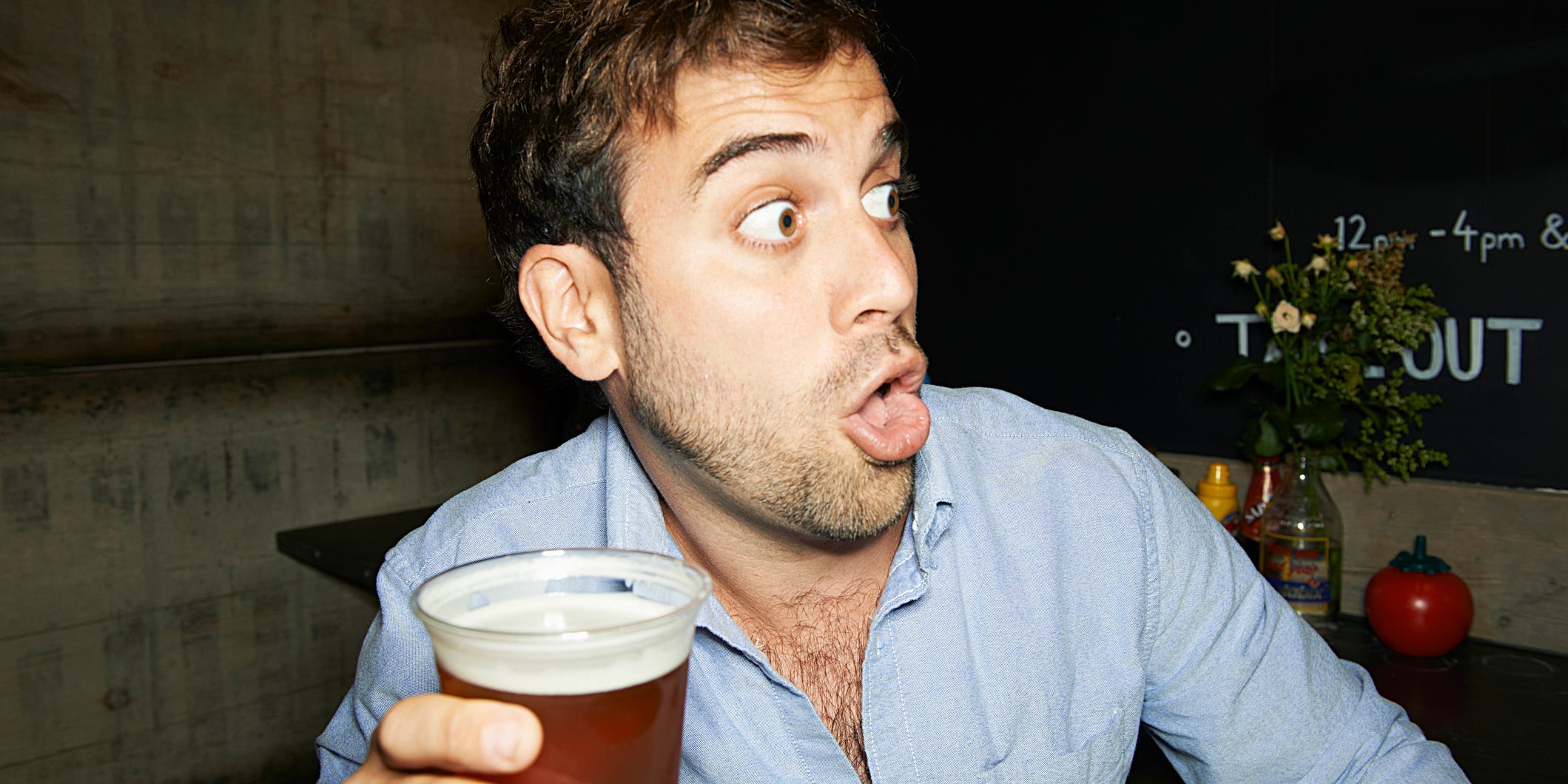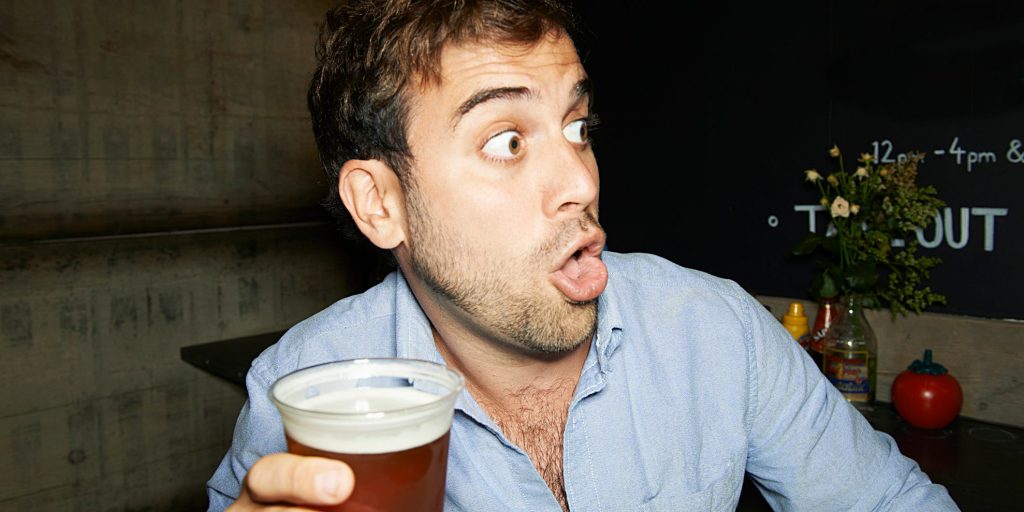
- Drinking beer before liquor won't make you sicker, as the popular saying goes.
- However, starting with beer gets you drunk at a slower rate than liquor.
- This can trick you into getting more drunk than you mean to if you later switch to liquor.
- Visit Insider's Health Reference library for more stories.
Beer before liquor never been sicker, liquor before beer, you're in the clear. It's a common saying at college parties, bachelorette parties, and other big nights out, but experts say there's no truth to the rhyme.
"The order in which you consumed your drinks is not likely to determine whether you will experience a hangover the next morning," says Shaun Carrillo, lead wellness coach at Providence St. Joseph Hospital.
Getting sick during a drinking session or the next day is more dependent on how much alcohol you take in, not necessarily what you drank, says Joseph Fisher, MD, a food scientist and founder of ZENO Functional Foods.
"If you are getting sick at all from drinking alcohol you are probably drinking too much," Fisher says.
Although no one knows the origin of the saying, it's likely perpetuated because of confirmation bias based on personal experience.
"Most evidence supporting these claims stem from anecdotal evidence and people's experiences of hangovers," says Carrillo.
What makes you get sick from drinking?
When you consume any type of alcohol, your body breaks it down into a chemical called acetaldehyde, says Brad Lander, PhD, a clinical psychologist and addiction medicine specialist at The Ohio State University Wexner Medical Center. Acetaldehyde is toxic, and causes you to become sick from drinking too much alcohol.
"The more, and faster, you drink, the more the acetaldehyde builds up and the sicker you feel," says Lander.
When you vomit after drinking it's your body's way of clearing acetaldehyde and other toxins associated with alcohol.
"Getting sick is your body's defense against alcohol poisoning," says Lander.
What happens when you drink beer before liquor?
The idea that you'll be sick if you drink beer before liquor is likely based on the idea that carbonation irritates the stomach, and possibly causes people to absorb liquor more quickly.
However, there's limited research to suggest that carbonation can increase alcohol absorption. Moreover, the research compared the effects of liquor-based cocktails with or without carbonation, not beer.
Beer has the lowest alcohol by volume compared to other popular types of booze like wine or hard liquor. One serving of beer, 12-ounces, contains about 5% alcohol; whereas a serving of liquor, 1.5 ounces, contains about 40% alcohol.
Beer also has more volume than a shot of liquor or a cocktail, says Fisher. Because of that, when you drink beer your blood alcohol content rises more slowly than it does when you drink liquor.
Since beer contains less alcohol, you're producing less acetaldehyde. That can make your night start off at a good pace, but could cause trouble later on, says Carrillo.
"When you start with drinks that have a lower alcohol content, your body is accustomed to getting drunk at a certain rate," he says. If you continue drinking with that rate in mind but switch to liquor, you could wind up too drunk.
What happens when you drink liquor before beer?
When you start the night with liquor you'll feel intoxicated sooner since liquor has a higher alcohol by volume, says Fisher. Consuming a set number of drinks — like one every hour — will get you more drunk if you're drinking cocktails, compared to beer.
"This could lead to feeling sicker," he says.
On the flip side, some people who start with liquor feel more intoxicated earlier on, and thus drink less over the course of the night, says Carrillo. That can leave them "in the clear." However, this all comes down to personal behavior and has nothing to do with the order you drink beer or liquor.
If you feel yourself getting too drunk and know you have hours of drinking ahead of you, switching to beer, with its lower alcohol by volume, could actually help you avoid getting sick, compared to if you continued drinking liquor.
"Add low-alcohol cocktails or no-alcohol beer or cocktails to your mix," says Fisher.
How to prevent getting sick in the first place
Getting sick is a sign of binge drinking, says Lander. Binge drinking is defined as reaching a blood-alcohol level of 0.08% or higher. That's done by drinking about four drinks in two hours for females, and five drinks in two hours for males.
The best way to avoid getting sick is to drink in moderation, rather than binge drinking. If you know you'll be indulging, you can also plan ahead.
"If you do find yourself in a situation where you will be consuming large amounts of alcohol, there are a few strategies to help reduce the severity of your hangover," says Carrillo.
Avoid drinking on an empty stomach
Alcohol is absorbed fastest in an empty stomach. Having food in your stomach slows alcohol absorption, giving your body a chance to clear acetaldehyde and reducing your chances of getting sick, says Lander.
Proteins like those in meats, fish, or dairy are especially helpful for slowing the absorption of alcohol, since they take a longer time for the stomach to break down, Fisher says.
Hydrate
Dehydration often goes hand-in-hand with a hangover, so drinking water throughout the night can help you avoid feeling sick. Fisher recommends drinking at least one glass of water per two alcoholic drinks.
If you find yourself drinking a lot of water, however, throw a sports drink into the mix. Drinking too much water can actually throw off your blood sodium levels, which can be extremely dangerous. But you can offset that by drinking something with electrolytes like Powerade, Gatorade, or Pedialyte.
Stick to clear and light-colored alcohols
In addition to ethanol, alcohol contains compounds called congeners. Some research links congeners to increased hangover symptoms.
Congeners are found more in red wine and darker liquors, like bourbon, than in clear liquors and white wine. Mixing alcohol that has lots of congeners with other alcohols "can certainly make you sicker," says Lander.
Plan ahead
Getting a solid night's sleep beforehand and taking an over-the-counter pain reliever can help control symptoms, but ultimately there's not much you can do to prevent a hangover after drinking too much.
"Don't plan on relying on hangover remedies," says Fisher. "Few, if any, have demonstrated any real benefits."
Unfortunately, you might also notice that you feel worse after a big night out the older you get. That could be because the enzymes that break down alcohol in the body decrease with age, leaving you more susceptible to the effects of alcohol — including feeling sick.
Insider's takeaway
Beer before liquor or liquor before beer? Ultimately it doesn't really matter, as long as you're drinking in moderation.
"You can drink anything — beer, liquor, or both — in any order and feel better the next day as long as you have a 'drinking smarter' plan that you stick to," says Fisher.
That should include avoiding binge drinking, eating while you drink, and hydrating plentifully. Most people have occasionally been sick after drinking, but if it happens to you regularly it's time to reconsider your drinking habits, especially as binge drinking becomes more common.
"The conversation should be around a smarter drinking plan and learning more about how to consume alcohol more intelligently," Fisher says.
Dit artikel is oorspronkelijk verschenen op z24.nl
